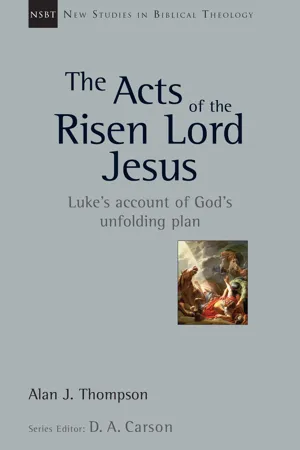
The Acts of the Risen Lord Jesus
Luke's Account of God's Unfolding Plan
- 232 pages
- English
- ePUB (mobile friendly)
- Available on iOS & Android
The Acts of the Risen Lord Jesus
Luke's Account of God's Unfolding Plan
About this book
When the book of Acts is mentioned, a cluster of issues spring to mind, including speaking in tongues and baptism with the Holy Spirit, church government and practice, and missionary methods and strategies. At the popular level, Acts is more often mined for answers to contemporary debates than heard for its natural inflections.Instead of using Acts as a prooftext, this New Studies in Biblical Theology volume brings a biblical-theological framework to the account to expose Luke's major themes as they relate to the book as a whole. With this framework in place, Alan Thompson argues that Acts is an account of the 'continuing story' of God's saving purposes. Consequently we find that Luke wants to be read in light of the Old Testament promises and the continuing reign of Christ in the inaugurated kingdom. Read in this way as a snapshot of God's dynamic, unfolding kingdom, the book of Acts begins to regain the deep relevance it had in the first century.Addressing key issues in biblical theology, the works comprising New Studies in Biblical Theology are creative attempts to help Christians better understand their Bibles. The NSBT series is edited by D. A. Carson, aiming to simultaneously instruct and to edify, to interact with current scholarship and to point the way ahead.
Tools to learn more effectively

Saving Books

Keyword Search

Annotating Text

Listen to it instead
Information
Chapter One
Living ‘between the times’: the kingdom of God
The sovereignty of God
Key terms
Israel’s history
God’s sovereignty in Israel’s history in Acts 7
God’s sovereignty in Israel’s history in Acts 13
Jesus’ life, death and resurrection Jesus’ life
Jesus’ death
Table of contents
- Cover
- Titles in this series
- Title Page
- Dedication Page
- Contents
- Series preface
- Author’s preface
- Abbreviations
- Introduction
- 1 Living ‘between the times’: the kingdom of God
- 2 The hope of Israel: the resurrection and the arrival of the last days
- 3 Israel and the Gentiles: the kingdom and God’s promises of restoration
- 4 The promise of the Father: the gift of the Holy Spirit
- 5 The end of an era: the temple system and its leaders
- 6 The end of an era: the law is no longer the direct authority for God’s people
- 7 Concluding summary
- Bibliography
- Index of authors
- Index of Scripture references
- Index of ancient sources
- Notes
- Praise for The Acts of the Risen Lord Jesus
- About the Author
- More Titles from InterVarsity Press
- Copyright
Frequently asked questions
- Essential is ideal for learners and professionals who enjoy exploring a wide range of subjects. Access the Essential Library with 800,000+ trusted titles and best-sellers across business, personal growth, and the humanities. Includes unlimited reading time and Standard Read Aloud voice.
- Complete: Perfect for advanced learners and researchers needing full, unrestricted access. Unlock 1.4M+ books across hundreds of subjects, including academic and specialized titles. The Complete Plan also includes advanced features like Premium Read Aloud and Research Assistant.
Please note we cannot support devices running on iOS 13 and Android 7 or earlier. Learn more about using the app